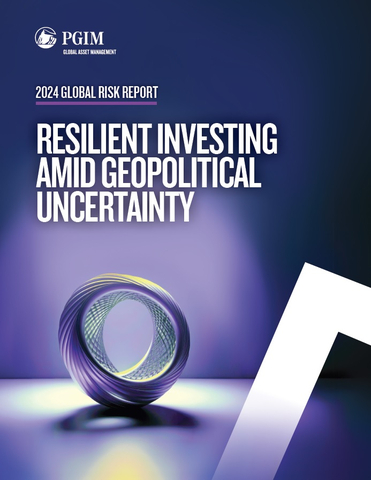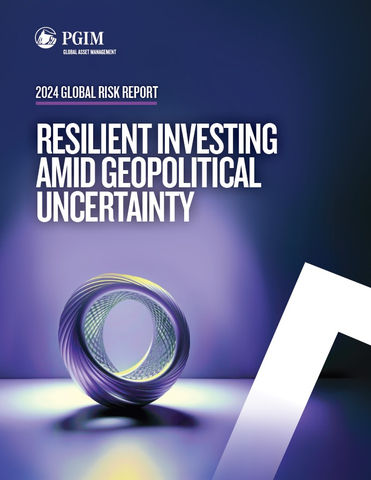NEWARK, N.J.--(BUSINESS WIRE)--A new survey from PGIM, the $1.33 trillion global asset management business of Prudential Financial, Inc. (NYSE: PRU),* finds that amid trade tensions between the U.S., Europe and China, major elections in over 70 countries this year, military conflicts, and structural changes in the global economy, more than half of top institutional investors (56%) say the threat level to their investments from geopolitical risk is their top concern. Even so, one-third plan a shift to higher-risk investments in 2025.
PGIM’s 2024 Global Risk Report: Resilient Investing Amid Geopolitical Uncertainty sets out to uncover how geopolitical risks are changing the way institutional investors are constructing their portfolios, surveying 400 institutional investors across eight countries, representing $9 trillion in assets under management. The results capture a growing sentiment that while the volatile state of geopolitics have global markets on edge, investors have grown less worried about other risks like inflation and recession fears.
OPPORTUNITY IN A TENSE GEOPOLITICAL ENVIRONMENT
Among possible geopolitical flashpoints, investors say they are monitoring the Taiwan Strait and South China Sea, with nearly half (48%) of investors identifying it as the risk most likely to impact global markets in the next 24 months, given its ties to asset prices. Just over a quarter (27%) said military conflict in the Middle East is the greatest risk.
However, despite a heightened sense of geopolitical risk, investors say they are ready to take on risk in their portfolios — a sign that institutions are taking a long-term view and looking at volatility as an opportunity. One-third of institutional investors in the survey said they plan to have an aggressive portfolio strategy (i.e., taking on more risk) by the end of 2025, compared with about one-quarter who are currently aggressive in their risk tolerance.
INVESTORS CAUTIOUS AROUND ELECTIONS, BUT DON’T EXPECT SURPRISES
More than half of investors globally (56%) say that the outcome of this year’s elections are a factor in their portfolio decisions.
While 29% of investors globally have held more cash in response to geopolitical uncertainty, this “flight to safety” was most pronounced in the U.S., where 41% of investors said they have moved into cash to manage risk. A majority of investors globally (55%) said they plan to increase cash allocations heading into elections.
About three-quarters of institutional investors also said their portfolios are moderately or well prepared for any repercussions stemming from major elections in 2024, reflecting confidence that policy outcomes in the U.S. and elsewhere will not come as a surprise. At least two-thirds said the same when polled about the investment impacts of trade subsidies and disputes, global debt levels, regulatory policies, and supply-chain disruptions.
INVESTMENT STRATEGIES FOR AN UNPREDICTABLE WORLD
Nearly half of the survey’s respondents (48%) feel there are now too many geopolitical risks to effectively mitigate their potential impact to portfolios. What can investors do when the fallout from geopolitical events is less certain?
The report details several approaches investors are using to manage geopolitical risk and identify investment opportunities — such as data centers and alternative energy — that are emerging as a result of geopolitical shifts.
A comprehensive approach to diversification and liquidity can mitigate risk by helping investors avoid becoming a forced seller during unexpected events. Quantitative models can make it possible to keep investors ahead of the curve as trends begin to change. Some solutions, such as buffered ETFs, can help mitigate downside risk while maintaining some exposure to the upside. Other recommendations include increasing allocations to real assets, stress-testing portfolios with scenario analysis, and utilizing active strategies.
For more, read PGIM’s 2024 Global Risk Report: Resilient Investing Amid Geopolitical Uncertainty at pgim.com/geopolitical-risk.
ABOUT PGIM
PGIM is the global asset management business of Prudential Financial, Inc. (NYSE: PRU). In 41 offices across 18 countries, our more than 1,400 investment professionals serve both retail and institutional clients around the world.
As a leading global asset manager with $1.33 trillion in assets under management,* PGIM is built on a foundation of strength, stability, and disciplined risk management. Our multi-affiliate model allows us to deliver specialized expertise across key asset classes with a focused investment approach. This gives our clients a diversified suite of investment strategies and solutions with global depth and scale across public and private asset classes, including fixed income, equities, real estate, private credit, and other alternatives. For more information, visit pgim.com.
Prudential Financial, Inc. (PFI) of the United States is not affiliated in any manner with Prudential plc, incorporated in the United Kingdom, or with Prudential Assurance Company, a subsidiary of M&G plc, incorporated in the United Kingdom. For more information please visit news.prudential.com.
* As of June 30, 2024




